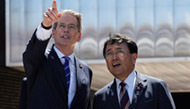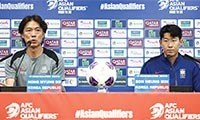President Obama has set a constructive new tone for trying to engage Iran.
President Bush’s failed policies have left Iran with enormous regional influence and frighteningly close to mastering the skills needed to build a nuclear weapon. The new administration will have to deal with Iran in a broader context, not just on the nuclear issue but also on Afghanistan and Iraq.
We don’t know if there is any mixture of incentives or sanctions that can wean Iran of its nuclear ambitions. But we are certain that the Bush administration never tried to find it. This means not only direct talks, but also far more persuasive incentives, including a credible offer of improved relations and security guarantees. Cooperation with Britain, France and Germany remains essential? and a much stronger push to try to bring the Russians and Chinese along.
We are not going to minimize the difficulties. Iran’s scientists are working aggressively to master nuclear fuel production, the hardest part of building a weapon. They just put a satellite in orbit, a sign that their ballistic missile program is moving ahead. It is difficult to read the politics in Tehran, but we are certain that hard-liners will try to sabotage any opening that would require making concessions on either program.
There will also be strong voices in Washington arguing against any compromise and some even for military action? a disastrous course. Iran’s support for Hamas and Hezbollah, its threats against Israel and its abysmal treatment of its citizens will only amplify those voices.
But we have seen the results of the Bush administration’s refusal to engage. It is time to at least test Tehran’s intentions.
That may be easier if the agenda for talks is broadened to include Afghanistan and Iraq. In 1998, Iran’s fundamentalist Shiiteled government nearly went to war with Afghanistan’s Sunni fundamentalist Taliban. After the United States ousted the Taliban in 2001, Tehran played a constructive role, helping establish a new government in Afghanistan. That limited collaboration quickly soured, and Iran has been accused of providing some support for the Taliban in an attempt to keep the Americans off balance. Mr.Obama needs to remind Iran that it is in its clear interest for the Taliban to be defeated and Afghanistan stabilized.
Iran’s relationship with Iraq is much more complicated. Analysts debate how much control Iran is seeking there and how much effort it is making to constrain extremists. But like the United States, Iran cannot possibly want Saudi Arabia, Turkey and other neighbors grabbing for pieces of Iraq when American troops leave. Mr.Obama can make a compelling argument that it is in Iran’s interest to join negotiations intended to guarantee Iraq’s longterm stability and sovereignty.
Mr.Obama is not presuming Tehran’s good will. Aides say he persuaded the Treasury Department’s Stuart Levey, who looked for creative ways to implement Mr.Bush’s sanctions policy, to stay on.
All that and more will be needed to try to make this work.
스마터리빙
more [ 건강]
[ 건강]이제 혈관 건강도 챙기자!
[현대해운]우리 눈에 보이지 않기 때문에 혈관 건강을 챙기는 것은 결코 쉽지 않은데요. 여러분은 혈관 건강을 유지하기 위해 어떤 노력을 하시나요?
 [ 건강]
[ 건강]내 몸이 건강해지는 과일궁합
 [ 라이프]
[ 라이프]벌레야 물럿거라! 천연 해충제 만들기
 [ 건강]
[ 건강]혈압 낮추는데 좋은 식품
[현대해운]혈관 건강은 주로 노화가 진행되면서 지켜야 할 문제라고 인식되어 왔습니다. 최근 생활 패턴과 식생활의 변화로 혈관의 노화 진행이 빨라지고
사람·사람들
more
“취미생활로 다진 친목… 선후배들과 만든 모교사랑”
사진러브한인 사진 동호회 사진러브(회장 크리스 고)는 13일 용수산에서 송년모임을 갖고 한 해를 마무리하는 뜻깊은 시간을 가졌다. 이날 모임에…

[홀인원] 이상원 박사
일반외과 전문의 이상원(왼쪽) 박사가 지난 9일 뉴포트비치 소재 골프장 9번 홀(152야드)에서 레스큐 클럽으로 친 샷이 그대로 홀에 빨려 들…
[송년행사 게시판] 재미시인협회
재미시인협회(회장 지성심)는 오는 20일 오후 4시 가든스윗호텔에서 한 해를 마무리하며 동인지 ‘외지’ 제35집 출판 기념회와 ‘제23회 재미…
[송년행사 게시판] 향군단체 연합
6.25 참전유공자회와 대한민국 육군협회 등 남가주 지역 향군 단체 연합은 19일 오전 11시30분, 용궁에서 송년 행사를 개최한다. 드레스코…
[송년행사 화보] “이웃과 함께 나누고 지인과 함…
KYCC13일 윌튼 플레이스 초등학교에서 열린 ‘한인타운청소년회관(KYCC) 홀리데이 카니발’이 성황리에 막을 내렸다. 올해는 KYCC 창립 …
많이 본 기사
- “1인당 2,000달러 환급금·세금 부담 역대 최저”
- ‘반이민 가속페달’⋯ 시민권자도 대거 추방
- ‘수퍼 독감’ 확산… 확진 4배 급증
- 캐롤라이나 항공기 추락 조종사·일가족 7명 사망
- ‘뇌종양 투병’ 윤석화, 끝내 별세..향년 69세
- 전현무, 차량 링거 결국 입 열었다.. “의사 진료 처방..불법 NO”
- 트럼프 행정부, 대마초 규제 완화
- 시신 훔쳐 팔아넘긴 부부 징역 중형 1
- 한인 부인 살해 혐의 남편 법정 출두 무죄 주장
- 상업용 임대계약,‘비즈니스 운명’ 빌리는 일
- 베네수엘라, 해군에 “유조선 호위하라”
- 구리 절도 기승⋯ 가로등 ‘깜깜’
- “이웃 돌보는 여러분이 동역자”
- 한인 헤지펀드 거물, CNN 인수 추진
- 박수홍 친형, 2심서 징역 3년 6개월 법정구속..형수 오열
- “첼시 판 돈 우크라에 쓰라” 영국, 러 재벌에 최후 통첩
- 거주·투자용 한국 부동산 인기… 한인 유치 ‘치열’
- “보이스피싱 이렇게 당한다”
- 음문석, ‘모범택시3’로 보여준 새로운 얼굴
- 연말이 되면 사라지는 선택들
- ‘주사이모’ 의혹에 입짧은햇님도 활동 중단… “의사라고 믿었다”
- “연대의 빛으로 증오 극복”
- 소기업 지원에 1천만 달러 투자
- ‘소셜번호 정지’메일 기승
- ‘재무장 선언’ 독일, 군장비 대거 구매
- 한국연극배우협회 “윤석화 별세 사실 아냐”…보도자료 정정·사과
- “판공비 1만달러 전액 반환하겠다” 4
- 오스카 시상식, 2029년부터 유튜브 생중계
- 한인 다큐 감독 크리스틴 최 별세
- ‘브라운대 총기참사’ 뉴욕 한인학생도 총상
- “왜 한국 자산 미국으로 옮겨야 하나… 1
- 월드컵 입장권 폭등 비판 FIFA, ‘60달러’ 티켓 발매
- [금요단상] AI와 동거, 그 실체
- 존 이 시의원 13만불 벌금 LA윤리위원회 최종 판결
- [만화경] 웰다잉 인센티브
- 허위광고 등 ‘연말 사기 주의보’
- 2025년, 성찰과 감사의 마무리를
- [화제] 베조스 전 부인… ‘기부의 여왕’ 변신
- 엔비디아·구글·오픈AI 등 빅테크들, 美 ‘제네시스 미션’ 합류
- 리 장군 동상 철거한 자리에 흑인 소… 2
- 인텔 준국유화·US스틸 황금주… 트럼프, 산업·금융 쥐락펴락
- 40·50대 은퇴, 자산은 있는데 확신은 없다
- 워싱턴 일원 소비 확 줄어들었다
- 한국타이어, 테네시공장 증설… 생산 두배로
- “취미생활로 다진 친목… 선후배들과 만든 모교사랑”
- 센터빌 식당서 벌써 4% 부과 ‘말썽’
- 올해 앵커 재산세 환급 163만명에 18억달러 지급
- 뉴욕주 안락사 합법화 초읽기 호쿨, “안전장치 마련되면 서명”
- 팀스피릿 부동산그룹 송년모임
- 국기원 버지니아-DC 지부, 자랑스러운 태권도인 시상식
1/5지식톡

-
 ☝️해외에서도 가능한 한국어 선생님…
0
☝️해외에서도 가능한 한국어 선생님…
0이 영상 하나면 충분합니다!♥️상담신청문의♥️☝️ 문의 폭주로 '선착순 상담'만 진행합니다.☎️ : 02-6213-9094✨카카오톡ID : @GOODEDU77 (@골뱅이 꼭 붙여주셔야합니다…
-
 테슬라 자동차 시트커버 장착
0
테슬라 자동차 시트커버 장착
0테슬라 시트커버, 사놓고 아직 못 씌우셨죠?장착이 생각보다 쉽지 않습니다.20년 경력 전문가에게 맡기세요 — 깔끔하고 딱 맞게 장착해드립니다!장착비용:앞좌석: $40뒷좌석: $60앞·뒷좌석 …
-
 식당용 부탄가스
0
식당용 부탄가스
0식당용 부탄가스 홀세일 합니다 로스앤젤레스 다운타운 픽업 가능 안녕 하세요?강아지 & 고양이 모든 애완동물 / 반려동물 식품 & 모든 애완동물/반려동물 관련 제품들 전문적으로 홀세일/취급하는 회사 입니다 100% …
-
 ACSL 국제 컴퓨터 과학 대회, …
0
ACSL 국제 컴퓨터 과학 대회, …
0웹사이트 : www.eduspot.co.kr 카카오톡 상담하기 : https://pf.kakao.com/_BEQWxb블로그 : https://blog.naver.com/eduspotmain안녕하세요, 에듀스팟입니다…
-
 바디프렌드 안마의자 창고 리퍼브 세…
0
바디프렌드 안마의자 창고 리퍼브 세…
0거의 새제품급 리퍼브 안마의자 대방출 한다고 합니다!8월 23일(토)…24일(일) 단 이틀!특가 판매가Famille: $500 ~ $1,000Falcon: $1,500 ~ $2,500픽업 & 배송직접 픽업 가능LA…
케이타운 1번가
오피니언
 한영일 / 서울경제 논설위원
한영일 / 서울경제 논설위원[만화경] 웰다잉 인센티브
 캐슬린 파커 워싱턴포스트 칼럼니스트
캐슬린 파커 워싱턴포스트 칼럼니스트 [캐슬린 파커 칼럼] 아이들을 온라인에서 보호하기
 양상훈 수필가ㆍ시인
양상훈 수필가ㆍ시인 [한국춘추] 경제대공황ㆍ제2차 세계대전 승리로 극복한 루스벨트 리더쉽

[왈가 왈부] 고환율에 외환 건전성 완화·서학개미 규제… 미봉책 아닌가요
 수잔 최 한미가정상담소 이사장 가정법 전문 변호사
수잔 최 한미가정상담소 이사장 가정법 전문 변호사 [수잔 최 변호사의 LIFE &] AI 시대 편리함에 안주하지 말자
 김도년 성균관대 건축학과 교수 스마트도시·건축학회장
김도년 성균관대 건축학과 교수 스마트도시·건축학회장 [로터리] 지멘스가 만드는 미래 동네
1/3지사별 뉴스

‘브라운대 총기참사’ 뉴욕 한인학생도 총상
▶총상 입은 상황서도 동료학생 의식 잃지않도록 도와 ▶부친도 동문 “우리 가족에게 고통스러운 일”지난 13일 발생한 브라운대학교 총기난사(본보…
뉴욕주 안락사 합법화 초읽기 호쿨, “안전장치 마련되면 서명”

“이웃 돌보는 여러분이 동역자”
워싱턴성광교회(담임목사 임용우)는 18일 한인단체와 소방서‧도서관 등에 총 2만9천 달러의 성금을 전달했다. 지난 2011년부터 15년째 지역…
소기업 지원에 1천만 달러 투자

베이지역 스포츠팀, SF 한인회에 후원금
샌프란시스코 베이지역 한인회(회장 김한일)는 한인 메이저리거 이정후 선수의 소속팀인 샌프란시스코 자이언츠(San Francisco Giants…
불자커뮤니티 20일 청소년발표회및 송년회

오늘 하루 이 창 열지 않음 닫기 




















































.png)


댓글 안에 당신의 성숙함도 담아 주세요.
'오늘의 한마디'는 기사에 대하여 자신의 생각을 말하고 남의 생각을 들으며 서로 다양한 의견을 나누는 공간입니다. 그러나 간혹 불건전한 내용을 올리시는 분들이 계셔서 건전한 인터넷문화 정착을 위해 아래와 같은 운영원칙을 적용합니다.
자체 모니터링을 통해 아래에 해당하는 내용이 포함된 댓글이 발견되면 예고없이 삭제 조치를 하겠습니다.
불건전한 댓글을 올리거나, 이름에 비속어 및 상대방의 불쾌감을 주는 단어를 사용, 유명인 또는 특정 일반인을 사칭하는 경우 이용에 대한 차단 제재를 받을 수 있습니다. 차단될 경우, 일주일간 댓글을 달수 없게 됩니다.
명예훼손, 개인정보 유출, 욕설 등 법률에 위반되는 댓글은 관계 법령에 의거 민형사상 처벌을 받을 수 있으니 이용에 주의를 부탁드립니다.
Close
x